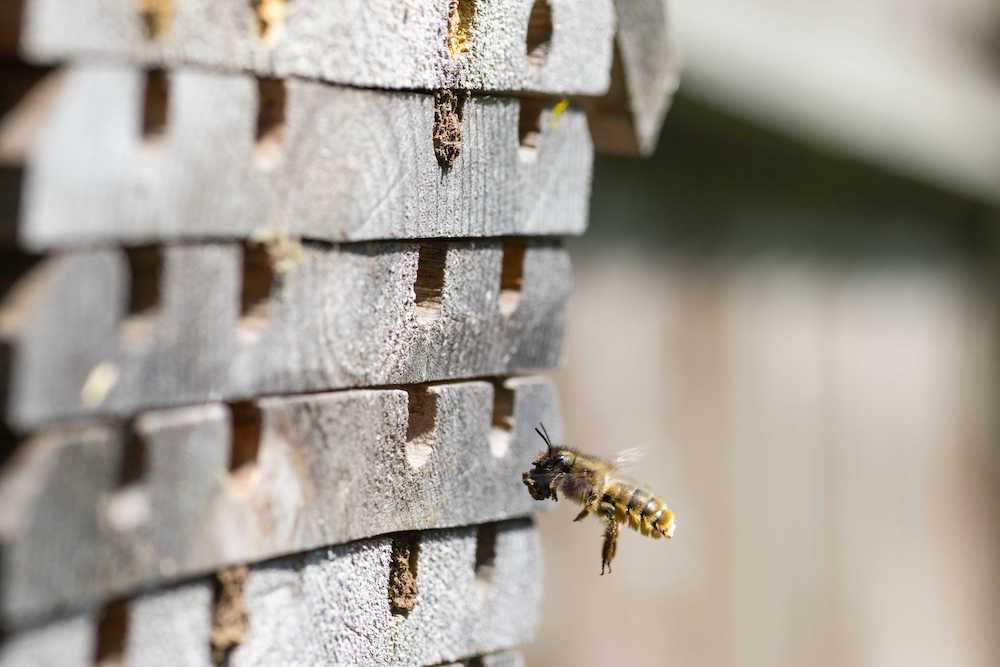
Home > Gardening News >
Scientists at the University of Sussex have launched a new experiment that will get bee lovers across the country buzzing.
As part of ‘The Big Bee Hotel Experiment’, the University is calling on volunteers across the country who have a bee hotel or are willing to make or buy one, to get involved in the project to help improve our understanding of bees and their favoured habitats.
Volunteers will need to sign up and send a photograph of their bee hotel entrance once a month throughout spring and summer.
The Sussex scientists will then be able to record how many holes have been occupied, and by which type of bee, based on the substance that the bees use to block the holes. For example, red mason bees use clay, whereas blue mason bees use plant resin. The findings will help to make bee hotels more effective.
A bee hotel is the insect equivalent of a birdhouse providing shelter and nesting sites for solitary bee species including mason bees, leafcutter bees and yellow-faced bees. 250 out of the 270 species of bees in the UK are solitary and do not live in colonies like bumblebees or honeybees.
Solitary bees are incredibly important pollinators, and the project aims to better understand which bee hotels work best, helping to inform how they should be made in future to help support conservation efforts.
The University of Sussex’s Professor Dave Goulson, who is leading the project, said:
“This is a fun project suitable for anyone – including children – who have access to an outside space and an interest in encouraging wildlife. If we can get hundreds of volunteers to take part, we will be able to work out how to make bee hotels more effective, and so help support our pollinators! Please join us!”
For those looking to take part, bee hotels can be bought or easily made at home. Professor Goulson suggests that this can be as simple as drilling varying-sized holes into a block of wood to encourage species to nest. Bee hotels can also be made from old tin cans or pieces of drainpipe filled with hollow plant stems, such as bamboo or Leycesteria.
Running from March to September, the project is a collaboration between The Buzz Club, a University of Sussex science club, and The Wildlife Community, a company which develops wildlife habitat products to enhance biodiversity.
Mark Pitman, Managing Director of The Wildlife Community said:
"We're delighted to be part of this nationwide experiment with The Buzz Club. We design and manufacture several bee hotels and the data coming from this collaboration will help us to continually improve our designs to make them even more effective."
The project is free to enter. Participants can register the details of their hotel on The Buzz Club website. Click here.
Everyone who registers will also have the option to be entered into a raffle to win a £250 voucher donated by The Wildlife Community.

This story was published on: 22/03/2024
Image attribution: Wildlife World Press
Links to external, or third party websites, are provided solely for visitors' convenience. Links taken to other sites are done so at your own risk and Garden Help accepts no liability for any linked sites or their content. When you access an external website, keep in mind that Garden Help has no control over its content. Any link from us to an external website does not imply or mean that Garden Help endorses or accepts any responsibility for the content or the use of such website. Garden Help does not give any representation regarding the quality, safety, suitability, or reliability of any external websites or any of the content or materials contained in them. It is important for users to take necessary precautions, especially to ensure appropriate safety from viruses, worms, Trojan horses and other potentially destructive items. When visiting external websites, users should review those websites' privacy policies and other terms of use to learn more about, what, why and how they collect and use any personally identifiable information. Hyperlinks and hypertext links are provided on our website to promote easy access to the variety of information and services provided. We accept no liability arising out of the use of such links, including: misuse or misunderstanding of these hyperlinks and hypertext links and web site navigational methods third party interpretation of data or information which is distributed around the web site and reached using hypertext and hyperlinks third party understanding of or use of the navigational structure of the site or the interpretation of distributed information on the site We may revise this disclaimer at any time, without prior notice, by updating this web page.
We work hard to make sure that every image is used properly and according to the creator's wishes. If you feel that there is a attribution or copyright issue, please Click Here IMMEDIATELY
Rikugien Gardens
Tokyo, Japan
RHS Garden, Wisley
Woking, United Kingdom
Gardens of the Generalife, Alhambra
Granada, Spain
Koishikawa Korakuen Gardens
Tokyo, Japan
Powerscourt Gardens
Enniskerry, Co. Wicklow, Ireland
Aswan Botanical Garden
Aswan, Egypt